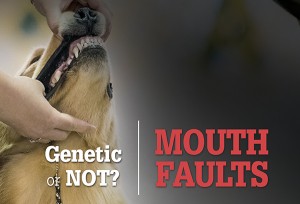Mouth Faults – Genetic or Not?
Click here to read the complete article
220 – June, 2023
 By William Given
By William Given
Most show dogs born of a well-planned breeding are blessed with good teeth. Our obligation as owners is to keep their teeth in good condition. This is not only necessary for the health of the dog, but every owner who shows his or her dog knows and understands the importance of full dentition and a proper bite in the conformation ring.
The average adult dog has 42 teeth, except in brachycephalic breeds which can have between 38 and 40. The reason for the difference is the lack of space in the upper jaw for a full complement of teeth.
Puppies normally cut their deciduous (baby) teeth beginning at about three weeks of age and are finished between six and eight weeks. Molars are not deciduous, so a puppy normally has 32 teeth. All of a puppy’s baby teeth are shed and replaced by permanent teeth between the ages of four and ten months. The molars appear about this time also. It is very important that we keep a close watch on our puppies to make sure that deciduous teeth are not retained at the time the permanent time are beginning to erupt.
There are a range of conditions that can affect the mouths of our canine companions. It is thought that this is due to the vast differences in skull shape and size between breeds–especially in toy and small dog breeds, as well as extensive breeding over time.
COMMON MOUTH FAULTS
Click here to read the complete article
220 – June, 2023

Short URL: https://caninechronicle.com/?p=264875
Comments are closed











